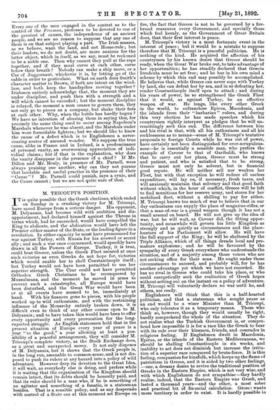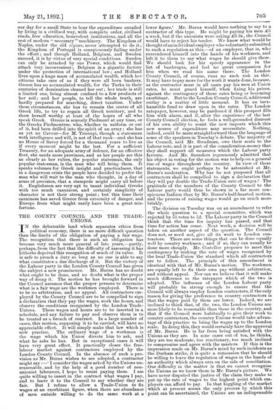M. TRICOUPI'S POSITION.
IT is quite possible that the Greek elections, which ended on Sunday in a crushing victory for M. Tricoupi, have saved Europe from a serious danger. His opponent, M. Delyannis, had become wild with ambition and dis- appointment, had declared himself against the Throne in terms which, had he succeeded, would have compelled the King to abdicate, and the abdication would have left the Premier either master of the State, or the leading figure in a revolution. In either capacity he must have pronounced for war against Turkey, with Russia for his avowed or secret ally ; and such a war once commenced, would speedily have drawn in all the Powers of Europe. Turkey, it is true, could beat Greece, unless the Greek Fleet secured at once such victories as even Greeks do not hope for, victories which would enable her to shell Constantinople itself; but Turkey would not have been permitted to use her superior strength. The Czar could not have permitted Orthodox Greek Christians to be reconquered by Mussultnans, and the moment he moved in arms to prevent such a catastrophe, all Europe would have been disturbed, and the Great War would have been or at all events have seemed to be, immediately at hand. With his finances gone to pieces, with his people worked up to wild enthusiasm, and with the restraining influence of the Monarchy entirely broken down, it is difficult even to think of any other course open to M. Delyannis ; and to have taken this would have been to offer every opportunity and every provocation for the long- expected struggle. As English statesmen hold that in the present situation of Europe every year of peace is a year "to the good," a year allowing at least a pos- sibility of a peaceful arrangement, they will consider M. Tricoupi's complete victory, as the Stock Exchange does, as a great and unexpected mercy. It not only disposes of M. Delyannis, but it shows that the Greek people is, in the long run, amenable to common-sense, and is not dis- posed to push its rulers at any hazard into a policy of wild adventure. However deep its devotion to the Great Idea, it will wait, as everybody else is doing, and prefers while it is waiting that the organisation of the Kingdom should remain intact, that its debts should be honestly paid, and that its ruler should be a man who, if he is something of an agitator and something of a fanatic, is a statesman besides. That is a sensible policy, and as any desperado with control of a State can at this moment set Europe on fire, the fact that Greece is not to be governed by a fire- brand reassures every Government, and specially those which feel keenly, as the Government of Great Britain does, that their first interest is peace. M. Tricoupi's victory is a most fortunate event in the interest of peace ; but it would be a mistake to suppose therefore that M. Tricoupi is a peaceful politician. He is nothing of the kind. He acquired the affection of his countrymen by his known desire that Greece should be ready, when the Great War broke out, to take advantage of her opportunities; he has steadily declared that Grtecia Irredenta must be set free ; and he has in his own mind a scheme by which this end may possibly be accomplished. He believes that, while Greece can never cope with Turkey by land, she can defeat her by sea, and in so defeating her, render Constantinople itself open to attack ; and during his years of power, he so strengthened the Greek Fleet that it would, as against Turkey, be an effective weapon of war. He longs, like every other Greek in the world, to enfranchise Epirus, Macedonia, and the islands from their " barbarian " rulers, and during this very election he has made speeches which his countrymen rightly interpret as pledges that he will un- remittingly seek this end. The difference between him and his rival is that, with all his enthusiasm and all his recklessness as to means—some of M. Tricoupi's tentative proposals to foreign Courts while he was out of power, have certainly not been distinguished for over-scrupulous- ness—he is essentially a sensible man, who prefers the example of Cavour to that of Garibaldi, who knows that to carry out her plans, Greece must be strong and patient, and who is satisfied that to be strong, Greece must not only be solvent, but in financial good repute. He will neither sell nor weaken her Fleet, but with that exception he will reduce all useless expenditure, will lay on, if necessary, fresh taxes, and will anxiously maintain that solvency and that good faith without which, in the hour of conflict, Greece will be left to find munitions for her reserve army, and stores for her mobilised fleet, without a shilling to pay for either. M. Tricoupi knows too much of war to believe that in our day enthusiasm can supply the place of magazine-rifles, or that a man-of-war is a grand weapon though it has not a small arsenal on board. He will not give up the idea of war, but he will wait, as Cavour did, the fitting oppor- tunity, and meanwhile will govern his little Kingdom as strongly and as quietly as circumstances and the place- hunters of his Parliament will allow. He will have the full support of the King ; he will be sheltered by the Triple Alliance, which of all things dreads local and pre- mature explosions ; and. he will be favoured by the sympathy of every Greek everywhere who understands the situation, and of a majority among those voters who are not seeking office for their sons. He ought under those circumstances to succeed, and probably will, for he has another advantage yet which we have not recorded. He has no rival in Greece who could take his place, or who could energetically seek the realisation of Greek hopes without setting out on the instant on a policy of adventure. M. Tricoupi will voluntarily declare no war until he, and others, are ready.
Englishmen will think that this is a half-hearted politician, and that a statesman who sought peace as an end would be a wiser Minister than M. Tricoupi, who only tolerates it as a temporary means. Those who think so, however, though they would usually be right, hardly comprehend the whole of the situation. They do not realise what the Turkish Government is, or compre- hend how impossible it is for a race like the Greek to bear with its rule over their kinsmen, friends, and comrades in religious feeling. If Englishmen dwelt in Macedonia, Epirus, or the islands of the Eastern Mediterranean, we should be shelling Constantinople in six weeks, and inability to act does not diminish but increase the irrita- tion of a superior race conquered by brute-force. It is this feeling, compassion for kinsfolk, which keeps up the flame of patriotism in Greece, and it is aided by two other feelings, —one, a dreamy desire to revive the traditional position of Greeks in the Eastern Empire, which is not very wise, and with which Englishmen do not sympathise—they hardly realise, indeed, that the Eastern Empire was Greek, and lasted a thousand years—and the other, a most sober and. practical bit of financial calculation. Greec3 wants more territory in order to exist. It is hardly possible in our day for a small State to bear the expenditure entailed by living in a civilised way, with complete order, civilised roads, free education, benevolent institutions, and all the rest of modern "necessary "machinery. The Kingdom of Naples, under the old regime, never attempted to do it ; the Kingdom of Portugal is conspicuously failing under the effort ; and though Holland, Belgium, and Sweden succeed, it is by virtue of very special conditions. Sweden can only be attacked by one Power, which would find attack very inconvenient ; Belgium is a gigantic factory under the protection of international law ; and Holland lives upon a huge mass of accumulated wealth, which her citizens take care of as if they were all born bankers. Greece has no accumulated wealth, for the Turks in their centuries of domination cleaned her out ; her trade is still a limited one, being almost confined to a few products of her Soil; and her people, to tell the whole truth, are hardly prepared for searching, direct taxation. Under these circumstances, she has to remain the centre of all Greek life, to try to regain all Greek territory, and to show herself worthy at least of the hopes of all who speak Greek. Greece is scarcely Piedmont at any time, or the Greeks Piedmontese. who, whether in uniform or out of it, had been drilled into the spirit of an army ; she has as yet no Cavour—for M. Tricoupi, though a statesman with intelligence and will, is not of that rank—and she has no House of Savoy forced for a thousand years to live as if every moment might be the last. For a sufficient Treasury, for an adequate army of defence, for an effective fleet, she needs more provinces, and as her people see this as clearly as her rulers, the popular statesman, the only popular statesman, is the man who will bring them. It speaks volumes for Greek insight and practicalness, that in a dangerous crisis the people have decided to prefer the man who will wait to the man who thought, in a day of arms of precision, that a stampede might carry all before it. Englishmen are very apt to taunt individual Greeks with too much canniness, and certainly simplicity of character is not their strong point ; but this time their canniness has saved Greece from extremity of danger, and Europe from what might easily have been a great mis- fortune.



































 Previous page
Previous page